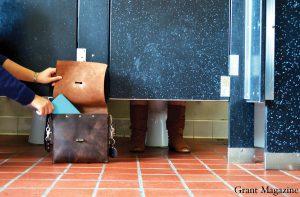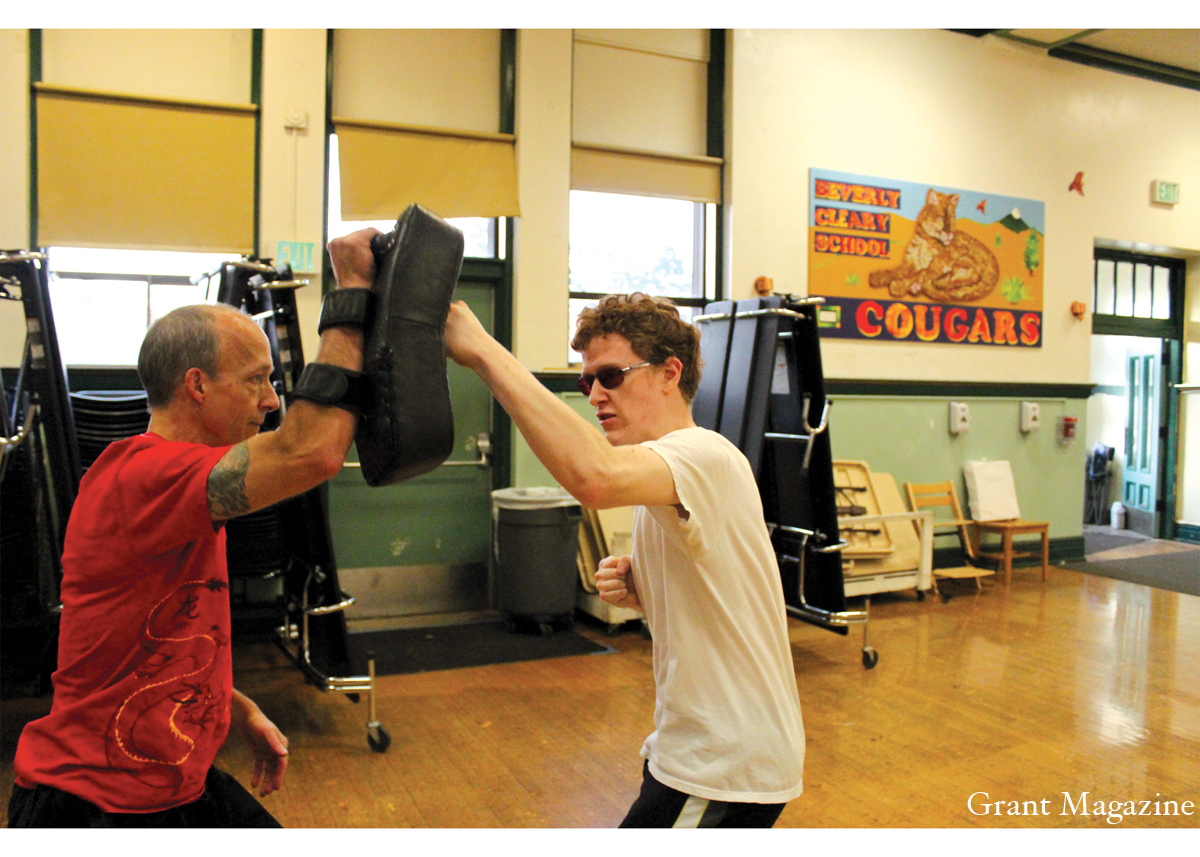Last month, a 14-year-old Violet Summersby’s fifth-generation iPod Touch rested facedown on her classroom desk, unattended. It wouldn’t be there for long.
Summersby was standing less than 10 feet away, presenting in front of her freshman writer’s workshop class. After finishing, she returned to her desk. Surrounded by her classmates, Summersby felt a sense of disbelief when she saw her iPod was missing.
“I was probably up there for five to 10 minutes,” she says. “I was really upset. It had all of my information on it. I kinda freaked out. I just wanted it back. I didn’t really care who had it.”
She filed a report, hoping to have it returned, but when she came home later that day, she was saved the trouble. “The first thing my dad said when I told him was, ‘I’ll buy you a new one,’” she says.
Unfortunately, Summersby’s incident isn’t a rarity at Grant High School. Theft of property has become a norm. It’s not just happening at Grant, either. Other schools face the same problems with students getting things lifted – bicycles, laptops, phones and other personal items.
But at Grant, security personnel, law enforcement officials and administrators are saying a new culture around theft has taken root. Instead of suspects paying the price for theft, the parents of the victims do. School police say that rather than attempting to get an item back with assistance from law enforcement, students shy away from prosecuting and rely on their parents, which evolves into a welcome invitation for thieves to continue stealing.
As a result, a culture is created that emboldens thieves: if no charges means no consequences, why not continue to steal?
“There has to be guidelines for what’s acceptable and not acceptable behavior,” says Sgt. Pete Simpson, a spokesman for the Portland Police Bureau. “And there has to be consequences for violating that behavior. The message it sends to other kids is if one kid gets away with something, then, ‘Well, if he got away with it, why can’t I? Maybe I should do that.’ And it has a ripple effect.”
It’s spreading, and especially at Grant, where campus monitor Vonnie Core says at least one theft report is filed every day. Items left alone for sometimes as little as 10 seconds can disappear and never be found by their owner again. Instead, they’re often replaced with their parents’ money.
While the usual theft consists of phones, iPods or wallets, there is always the occasional bike, laptop or backpack that gets snatched from students who aren’t paying attention. “If people want stuff, they’re gonna take it, unfortunately,” says Core.
But within this new culture, it seems like students care less when they are victims of theft. “For the person that’s done the stealing, it empowers them to continue stealing,” Simpson says. “If I steal somebody’s money or phone and nothing happens to me, why would I stop stealing it? There’s that part of it, too. People who live without consequences will continue to push the envelope.”
When senior Atticus Jones got his laptop stolen in the school library on his birthday in 2012, he anticipated a painful interaction with his parents.
“They were kind of frantic,” he says. “It was my first day bringing it to school, and I promised I wouldn’t lose it, and I lost it.”
The worrying was short-lived. Jones received a 2012 version of the same laptop in October of that year, courtesy of his parents.
Officer De Shawn Williams has been assigned to Grant for three years. He’s witnessed firsthand the effect this culture has had.
“It’s enabled the people who actually prey on other people for that,” he says. “It kind of gives them a green light to go, ‘They don’t care. Why should I care that I take this thing that someone has worked hard to pay for? They’ll just get another one.’”
Williams says he regularly has had situations where victims know who the thieves are, but shy away from reporting the crime.
After all, when your parents will replace the item, what’s the point of filing a report to get it back?
Simpson says that such a culture has blurred the lines between what’s ethical and what’s not.
“Rather than report it and potentially be labeled a snitch by peers and classmates, kids would rather just say they lost it and hope that mom or dad buys them a new one,” he says. “And that’s because of the peer pressure that exists at a school setting.”
New Grant High School principal Carol Campbell wants to believe the best. She says that in high schools, most thefts that occur are a result of carelessness by the owner.
While there are also cases of intentional or malicious thieving, Campbell says most of the thefts that she’s witnessed have purely been from brief windows of opportunity.
“It seems to be opportunistic,” Campbell says. “It’s normally a case of someone setting something down and leaving it unprotected. It’s really pretty rare to see it become intentional.”
Campbell, who taught at Grant for nine years, remembers being called out of class one day, and she had a substitute fill in while she was away. During her absence, a student went up to the front of the room and rifled through her desk, eventually snatching her purse.
“We’re at the mercy of opportunistic people who see us set these things down and walk away,” she says.
Outside of high schools, police say they’ve seen all kinds of reasons for people to steal. “Out there, people are hurting,” Williams says. “People are gonna steal whatever they can. Dollars, even. They really don’t care what they take.”
Before technology evolved, theft was relegated to lower value items. Thieves were often stealing car antennas, wallets, bikes and whatever else they could get their hands on to make a few bucks.
Then came the cell phones. Then laptops. Then tablets. High value, but higher risk.
“I don’t think the theft is just at Grant High School,” says student support staffer Marty Williams, who works as the school’s Self Enhancement Inc. coordinator but used to be involved in security. “I think it’s a generational thing. Technology sells. And if there wasn’t such a high demand for technology, I don’t think there would be as much theft.”
“Everybody seems to have a phone,” says Officer Williams. “No matter how much they make, or how much money they have. Everybody has a phone. I mean, there’s six-year-olds running around with iPhones. It’s crazy.”
With smartphones, it’s not unusual for people to store all of their vital information on them. “I know plenty of young folks who don’t have money for stuff,” Officer Williams says. “Their lifeline is their iPhone. Like, me? I have everything on my phone. If somebody takes that? I’m going to find out where it is. And if I know where it is, I guarantee you I’m going to get my stuff back.”
But that doesn’t always happen for students, even when they do the right thing and file a report. When 15-year old sophomore Ethan Shields discovered his bike missing from in front of the Grant pool last year, he couldn’t help but wonder how it happened.
“I was sort of shocked initially,” Shields recalls. “Then I started wondering how exactly (the thief) found a time when no one was looking.”
Just two days before Shields’ bike was stolen, his good friend had one taken from the same spot.
Wen Wu, Shields’ mother, expressed concern about what she considered a lax approach by the school. “I don’t know what the school has done over the years to improve the security,” Wu says.
With better security, Wu feels the bike environment would be safer and allow students to lock their bikes more comfortably.
Shields filed a report with Grant officials and also filed a police report. Nothing ever came of it. He went without a bike for some time but recently received a new one. He hasn’t brought it to school yet because of his previous experience.
“After that happened, I was a little more cautious about bringing valuable stuff to school,” he says.
Core says there’s a consistent theme with bike thefts at Grant: flimsy cable locks. “Cable locks are just way too cheap,” she says. “You get what you pay for, I guess.”
Officer Williams agrees. “I’d say 90 percent of bike thefts are either because they didn’t lock it the right way or because they were using one of those cable locks,” he says.
School officials say it’s rare to have stolen items retrieved. But sometimes, students don’t put themselves in a position to get things back. Core recalls the time last month when Summersby’s iPod Touch was stolen.
On the same day, Core ran into another situation where someone didn’t report a stolen item. “I go back to my office, and the same girl who hears the conversation about the iPod Touch tells me, ‘Oh, by the way, about two weeks ago, I lost my iPhone,’” Core recalls. “She describes it – and it’s the iPhone that I’ve had locked up for several weeks.”
When Core asked the girl why she didn’t fill out the lost property report, the girl answered, “Oh, I still have it in my backpack. I just didn’t get around to it.”
“So we take two steps backwards and make one little baby step forward,” Core says. “We have two items that have been stolen and then one item that’s been retrieved. That happened in about a 30-minute time frame. And it’s so crazy how it happens like that.”
Police say punishing the behavior now can have a positive impact on the community later. “If you’re never held accountable for anything in high school, when you get older, it’s harder for you to accept accountability,” Simpson says. “Pretty soon, it becomes more of a habit than just a one time thing. And the more people get away with stuff, the more they rationalize with their behavior being OK.”
As far as prevention goes, Officer Williams feels that students simply need to be more observant.
“Don’t put anything down that you’re not prepared to lose,” he says. “These days, everything’s on one phone. People are depending on these items. If you can’t afford to lose it, hold on to it.”
Campbell agrees. “There’s always going to be that potential to get things stolen from you,” she says. “You should always be aware of that.” ♦








































